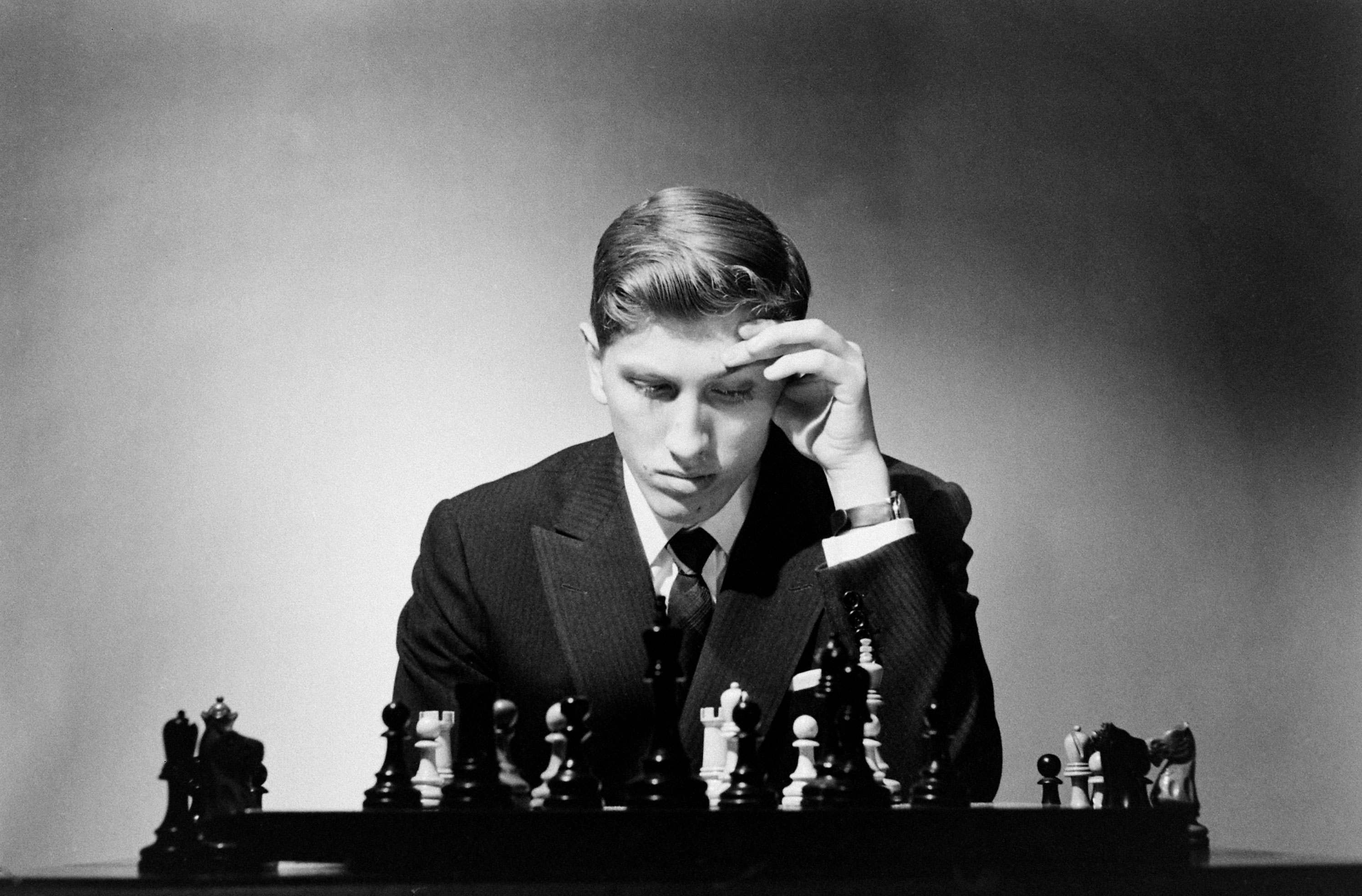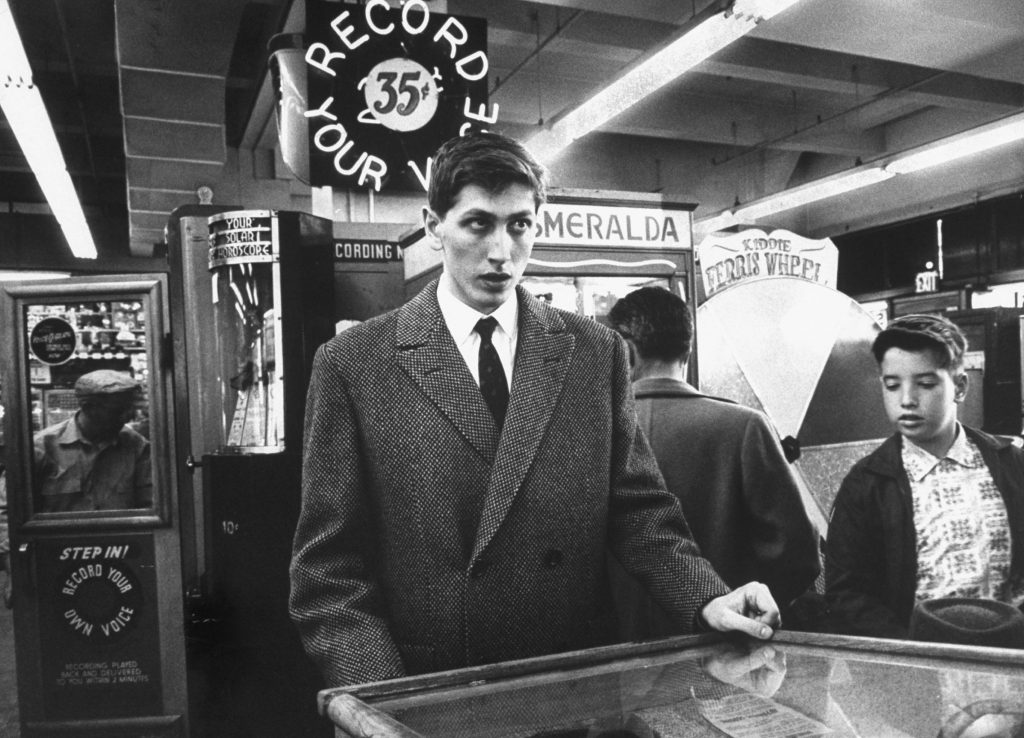Written By: Ben Cosgrove
Bobby Fischer was only 29 when, in the midst of the Cold War, he defeated the Russian defending champion Boris Spassky in the World Chess Championship on September 1, 1972, ending 24 years of Soviet dominance in the intense, rarefied realm of big-league chess. The match, held in Reykjavik, Iceland, was a massively hyped event “The Match of the Century” with a build-up worthy of a Super Bowl or the Olympics and the sort of pre-battle media conjecture usually reserved for heavyweight title bouts. Which, in a sense, the match was.
That Fischer was a genius, with one of the most innovative and thrilling minds ever to address a chess board, is largely undisputed. He played in eight U.S. chess championships and won all eight, decisively. In 1956, when he was just 13, he defeated the celebrated American chess master, Donald Byrne, in what Chess Review pegged as “The Game of the Century.” He routinely won international matches by record margins, and in the early 1970s was the number-one rated player in the world for more than four years.
But as renowned and imaginative a Chess Master as Fischer was, in later years his bizarre behavior and his increasingly strident political views (virulently anti-American and anti-Semitic, for the most part, although his mother was Jewish) overshadowed his brilliance and his accomplishments. When he died in 2008, he was living in Iceland—the scene of his greatest professional triumph, and where he had been granted full citizenship in 2005. The American Chess Federation had permanently revoked his membership years before, after he publicly applauded and defended the September 11, 2001, terror attacks as utterly justified and predictable payback in light of America’s policies in the Middle East and elsewhere around the globe. (“The U.S. and Israel have been slaughtering the Palestinians for years,” he said shortly after 9/11.)
Long before he beat Spassky, however, and five decades before he finally went to ground in Iceland to live out his last days, LIFE’s Carl Mydans photographed Fischer as a prodigiously talented (and, already, clearly a bit odd) young man living in Brooklyn, New York.
In a February 1964 profile of Fischer, “One-Track Mastermind,” that LIFE published more than a year after Mydans made his photographs, the magazine noted:
Once in a while Bobby Fischer strolls into one of the Times Square amusement arcades and stokes coins into a pinball machine. If you noticed him at all as he stands there, staring at the lighted scoreboard, you’d probably write him off as just another lost young man, and maybe not a very bright one.
You would be mistaken. Bobby hasn’t the slightest flicker of doubt about who he is or what he wants to do. In an age that idolizes well-roundedness he has a single aim: “All I want to do, ever,” he says,” is play chess.”
But even in this genuinely glowing portrait of a quirky, brilliant loner, there are nevertheless hints of a monomaniacal self-absorption and a dismissive attitude toward anyone not Bobby Fischer that, encountered years later, feel very much like the early rumblings of profound trouble to come.
His sister, LIFE notes, taught him chess “when he tired of Parcheesi and other children’s games,” but Fischer’s attitude toward women in general comes across even for the early 1960s as sneeringly adversarial.
“Women are lousy at chess. They’re meant to say at home. I bet I could take any man of average intelligence, a rank beginner, give him, oh, around two months of lessons, and have him at the end of that time beat the women’s world champion. Any man.”
Near the end of the piece, the narrow but unfathomably deep focus of Fischer’s life comes into pitiless focus:
Always in his mind are the 64 squares of the chessboard, with its pieces arranged in one of millions of possible combinations. Always he is thinking of his next match.
“It’s not exactly easy, keeping up the [U.S.] championship,” he says. “It’ll keep me busy all the rest of my life.”
Here, LIFE.com presents a selection of photos most of which never ran in LIFE that capture the phenomenally gifted (and commensurately confident) Fischer as he leaves his “child prodigy” years behind and enters, a tad awkwardly, the fraught world of adulthood. This is a portrait of the chess artist as a young man: images capturing a relatively calm stage in a life that, for all of its triumphs, would grow increasingly dark and relentlessly unbalanced as the years passed.

Bobby Fischer in New York City, 1962
Carl Mydans The LIFE Picture Collection/Shutterstock

Bobby Fischer with his half-sister, Joan, and her daughter, Elisabeth, 1962.
Carl Mydans The LIFE Picture Collection/Shutterstock

Bobby Fischer in New York City, 1962
Carl Mydans The LIFE Picture Collection/Shutterstock

Bobby Fischer in New York City, 1962.
Carl Mydans The LIFE Picture Collection/Shutterstock

Bobby Fischer on the subway, New York, 1962.
Carl Mydans The LIFE Picture Collection/Shutterstock

Bobby Fischer in a used bookstore, New York, 1962.
Carl Mydans The LIFE Picture Collection/Shutterstock

Bobby Fischer plays chess with an unidentified opponent , New York, 1962.
Carl Mydans The LIFE Picture Collection/Shutterstock

Bobby Fischer at a ballgame, New York, 1962.
Carl Mydans The LIFE Picture Collection/Shutterstock

Original caption: “With chess problems spinning in his head by the millions, Bobby relaxes at a coin pinball machine.”
Carl Mydans The LIFE Picture Collection/Shutterstock

Bobby Fischer in New York City, 1962.
Carl Mydans The LIFE Picture Collection/Shutterstock

Bobby Fischer in New York City, 1962.
Carl Mydans The LIFE Picture Collection/Shutterstock



















